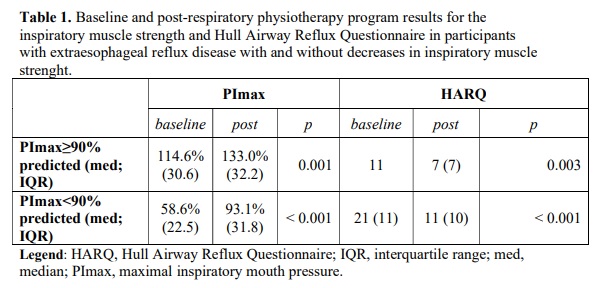Abstract
Respiratory physiotherapy (RP), including inspiratory muscle training (IMT), is effective in decreasing esophageal symptoms in people with gastroesophageal reflux disease, who experienced decreased maximal inspiratory mouth pressure (PImax). However, its effects on symptoms of extraesophageal reflux disease (EERD) are unclear. Therefore, we explored the effects of a RP program on symptoms of EERD in symptomatic patients with decreased PImax and symptomatic patients with normal PImax.
Patients with EERD underwent an 8-week RP program including diaphragmatic breathing, IMT, and postural training. PImax and symptom severity according to Hull Airway Reflux Questionnaire (HARQ) were assessed at baseline and after the RP program.
36 participants were included. Participants were divided into two groups according to their initial PImax: group 1 with PImax ? 90% of predicted (15 patients, 45.6 years old) and group 2 with PImax < 90% of predicted (21 patients, 46.9 years old). Participants in group 2 presented significantly more severe symptoms in HARQ than patients in group 1 at baseline (p=0.04). PImax and HARQ significantly improved in both groups (Tab. 1). Symptom severity did not significantly differ between the tested groups after RP (p=0.45).
According to the results, the RP program including IMT seems to improve symptoms of EERD in patients with EERD with and without decreases of their PImax.
